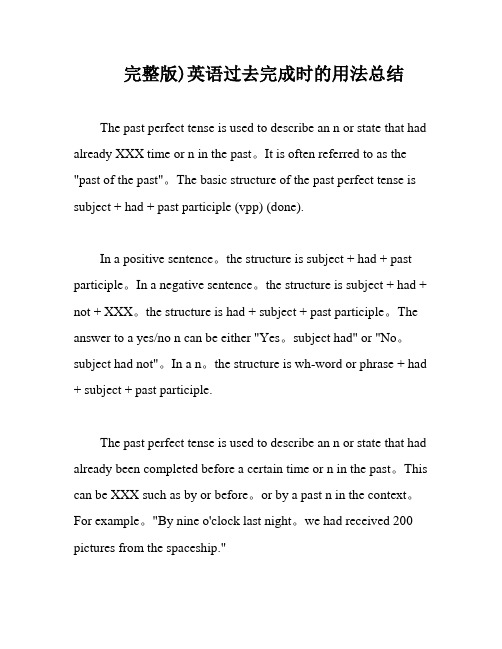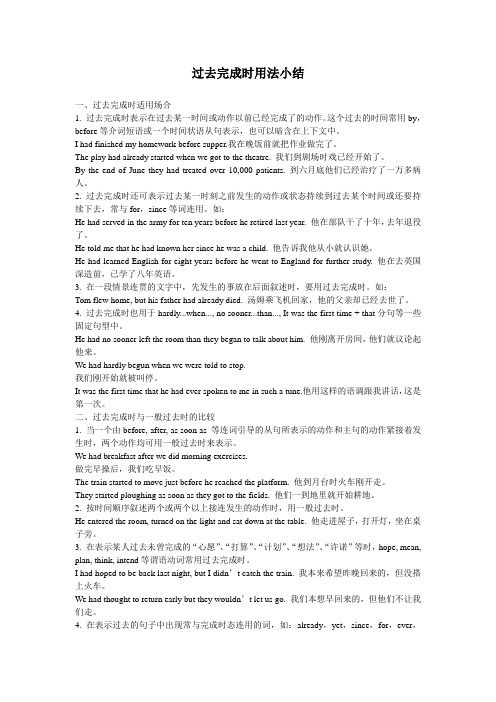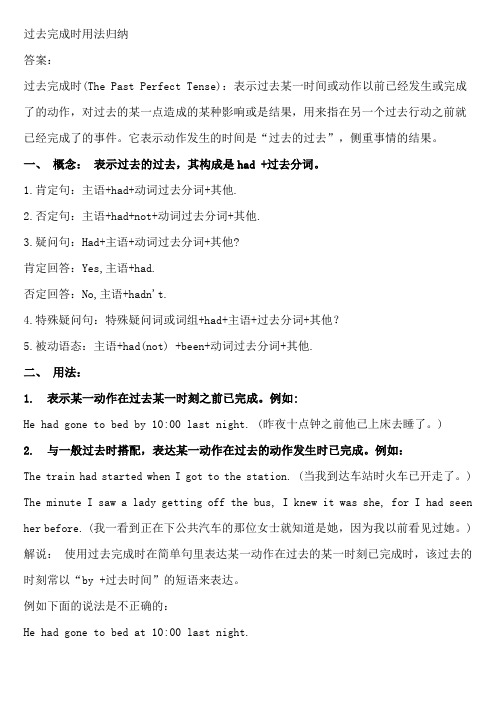过去完成时用法小结
完整版)英语过去完成时的用法总结

完整版)英语过去完成时的用法总结The past perfect tense is used to describe an n or state that had already XXX time or n in the past。
It is often referred to as the "past of the past"。
The basic structure of the past perfect tense is subject + had + past participle (vpp) (done).In a positive sentence。
the structure is subject + had + past participle。
In a negative sentence。
the structure is subject + had + not + XXX。
the structure is had + subject + past participle。
The answer to a yes/no n can be either "Yes。
subject had" or "No。
subject had not"。
In a n。
the structure is wh-word or phrase + had + subject + past participle.The past perfect tense is used to describe an n or state that had already been completed before a certain time or n in the past。
This can be XXX such as by or before。
or by a past n in the context。
动词时态过去完成时的用法

动词时态过去完成时的用法动词时态在英语语法中扮演着重要的角色,它用于准确描述一个动作或状态是发生在过去、现在还是将来。
过去完成时是过去时态中的一种,用来表示在过去某一时间或事件之前已经发生的动作或状态。
本文将详细介绍过去完成时的用法及相关例句。
一、过去完成时的结构与构成:过去完成时的结构由助动词“had”加上过去分词构成。
例如:“had + 过去分词”。
二、过去完成时的用法:1. 表示过去某一时间或事件之前已经完成的动作或状态:过去完成时用于描述在过去某个时间点、事件或动作之前已经完成的另一个过去动作或状态。
此时,通常与表示过去的时间状语连用,如:by the time, before, when等。
例句1:By the time I arrived, she had already left.(在我到达时,她已经离开了。
)例句2:He had finished his homework before he went to bed.(他睡觉之前已经完成了作业。
)2. 表示过去直到某一时间已经发生或已经完成的动作或状态:过去完成时还可用于表示过去某一时间一直延续到另一过去时间之前已经发生或完成的动作或状态。
例句1:She had lived in New York for three years before she moved to London.(在她搬到伦敦之前,她在纽约已经住了三年。
)例句2:They had known each other since they were children.(他们从小就认识彼此。
)3. 与过去某一时间的比较:过去完成时可用于与过去某一时间进行比较,表示在过去某一时间之前已经完成的动作或状态。
例句1:John had already left when I arrived home.(我到家的时候,约翰已经离开了。
)例句2:She had finished her presentation by the time the meeting started.(会议开始时,她已经完成了演讲。
过去完成时用法小结

过去完成时用法小结一、过去完成时适用场合1. 过去完成时表示在过去某一时间或动作以前已经完成了的动作。
这个过去的时间常用by,before等介词短语或一个时间状语从句表示,也可以暗含在上下文中。
I had finished my homework before supper.我在晚饭前就把作业做完了。
The play had already started when we got to the theatre. 我们到剧场时戏已经开始了。
By the end of June they had treated over 10,000 patients. 到六月底他们已经治疗了一万多病人。
2. 过去完成时还可表示过去某一时刻之前发生的动作或状态持续到过去某个时间或还要持续下去,常与for,since等词连用。
如:He had served in the army for ten years before he retired last year. 他在部队干了十年,去年退役了。
He told me that he had known her since he was a child. 他告诉我他从小就认识她。
He had learned English for eight years before he went to England for further study. 他在去英国深造前,已学了八年英语。
3. 在一段情景连贯的文字中,先发生的事放在后面叙述时,要用过去完成时。
如:Tom flew home, but his father had already died. 汤姆乘飞机回家,他的父亲却已经去世了。
4. 过去完成时也用于hardly...when..., no sooner...than..., It was the first time + that分句等一些固定句型中。
He had no sooner left the room than they began to talk about him. 他刚离开房间,他们就议论起他来。
过去完成时的用法及例句解析

过去完成时的用法及例句解析过去完成时是英语中一种用于表示过去某个时间点或动作之前已经完成的动作或状态的时态。
在使用过去完成时时,我们通常需要提供两个具体的过去时间点或动作,以强调其中一个发生在另一个之前。
一、过去完成时的结构过去完成时的结构为“had + 过去分词”,其中“had”为过去完成时的助动词,表示主语在过去某个时间点之前已经完成的动作或状态。
二、过去完成时的用法1. 表示过去某个时间点之前已经完成的动作或状态。
例句:- When I arrived at the cinema, the movie had already started.(当我到达电影院时,电影已经开始了。
)- Emily realized that she had left her keys at home after she arrived at the office.(埃米莉在到达办公室后才意识到她把钥匙忘在家里了。
)2. 表示过去某个动作之前已经完成的动作或状态。
例句:- John had washed the dishes before he went to bed.(约翰在上床睡觉之前已经洗了碗。
)- The students had studied English for two years before they took the proficiency test.(学生们在参加熟练度测试前已经学习了两年英语。
)3. 用于虚拟语气句型中,表示对过去某个时间点或动作的假设或推测。
例句:- If I had known you were coming, I would have baked a cake.(如果我早知道你要来,我就会烤一个蛋糕。
)- She would have passed the exam if she had studied harder.(如果她更努力学习的话,她本来会通过考试的。
)4. 用于时间状语从句中,表示过去某个时间点或动作之前已经完成的动作或状态。
过去完成时用法归纳

过去完成时用法归纳答案:过去完成时(The Past Perfect Tense):表示过去某一时间或动作以前已经发生或完成了的动作,对过去的某一点造成的某种影响或是结果,用来指在另一个过去行动之前就已经完成了的事件。
它表示动作发生的时间是“过去的过去”,侧重事情的结果。
一、概念:表示过去的过去,其构成是had +过去分词。
1.肯定句:主语+had+动词过去分词+其他.2.否定句:主语+had+not+动词过去分词+其他.3.疑问句:Had+主语+动词过去分词+其他?肯定回答:Yes,主语+had.否定回答:No,主语+hadn't.4.特殊疑问句:特殊疑问词或词组+had+主语+过去分词+其他?5.被动语态:主语+had(not) +been+动词过去分词+其他.二、用法:1. 表示某一动作在过去某一时刻之前已完成。
例如:He had gone to bed by 10:00 last night. (昨夜十点钟之前他已上床去睡了。
)2. 与一般过去时搭配,表达某一动作在过去的动作发生时已完成。
例如:The train had started when I got to the station. (当我到达车站时火车已开走了。
) The minute I saw a lady getting off the bus, I knew it was she, for I had seen her before. (我一看到正在下公共汽车的那位女士就知道是她,因为我以前看见过她。
) 解说:使用过去完成时在简单句里表达某一动作在过去的某一时刻已完成时,该过去的时刻常以“by +过去时间”的短语来表达。
例如下面的说法是不正确的:He had gone to bed at 10:00 last night.若是要说“at 10:00 last night”就必须用一般过去时“He went to bed...”。
过去完成时用法详解

过去完成时用法详解 TYYGROUP system office room 【TYYUA16H-TYY-TYYYUA8Q8-过去完成时用法小结一、过去完成时适用场合1. 过去完成时表示在过去某一时间或动作以前已经完成了的动作。
这个过去的时间常用by,before等介词短语或一个时间状语从句表示,也可以暗含在上下文中。
I had finished my homework before supper.我在晚饭前就把作业做完了。
The play had already started when we got to the theatre. 我们到剧场时戏已经开始了。
By the end of June they had treated over 10,000 patients. 到六月底他们已经治疗了一万多病人。
2. 过去完成时还可表示过去某一时刻之前发生的动作或状态持续到过去某个时间或还要持续下去,常与for,since等词连用。
如:He had served in the army for ten years before he retired last year. 他在部队干了十年,去年退役了。
He told me that he had known her since he was a child. 他告诉我他从小就认识她。
He had learned English for eight years before he went to England for further study. 他在去英国深造前,已学了八年英语。
3. 在一段情景连贯的文字中,先发生的事放在后面叙述时,要用过去完成时。
如:Tom flew home, but his father had already died. 汤姆乘飞机回家,他的父亲却已经去世了。
4. 过去完成时也用于hardly...when...(刚…就…), no sooner...than... (刚…就…),It was the first time + that分句等一些固定句型中。
过去完成时知识点归纳与总结
过去完成时知识点归纳与总结过去完成时是英语中的一种时态,表示过去某一时间点或动作之前已经发生或完成的动作或状态。
在句子中,过去完成时通常由had + 过去分词构成。
本文将对过去完成时的用法进行归纳与总结。
一、过去完成时的基本用法1. 表示在过去某一时间点或动作之前已经发生或完成的动作或状态。
例如:By the time she arrived, I had already finished the work.(她到达时,我已经完成了工作。
)2. 表示过去某一时间点之前的持续或延续的动作或状态。
例如:He had lived in Paris for five years before he moved to London.(他在搬到伦敦之前在巴黎生活了五年。
)二、过去完成时的用法细节1. 过去完成时常与表示过去某一时间点的时间状语连用,如by the time, before, already, just, etc.例如:She had already left when I arrived.(当我到达时,她已经离开了。
)2. 过去完成时可以用于宾语从句中,表示在主句动作之前已经发生或完成的动作或状态。
例如:I didn't know that she had already seen the movie.(我不知道她已经看过这部电影。
)3. 过去完成时可以用于条件句中,表示与过去某一时间点相反的假设情况。
例如:If I had known you were coming, I would have prepared dinner.(如果我知道你要来,我会准备晚餐的。
)4. 过去完成时可以用于间接引语中,表示在引述的过去时间点之前已经发生或完成的动作或状态。
例如:She told me that she had already finished her homework.(她告诉我她已经完成了作业。
英语before用法小结(6篇)
英语before用法小结(6篇). 过去完成时主要有以下几点用法:篇一1、表示过去某一时间或动作之前已经发生或完成的动作或存在的状态。
句中常用by, before, when, until等词引导的时间状语。
它是以过去某一时间为起点,所以过去完成时是一个相对的时态,表示的是“过去的过去”。
只有和过去某时间或某动作相比较时才能用到它。
例如:Most of the guests had left when he arrived at the party. 当他到达晚会时,他发现大多数客人已经离开了。
2、过去完成时还可表示过去某一时刻之前发生的动作或状态持续到过去某个时间或持续下去,常与for, since等词连用。
例如:When Jack arrived, he learned Mary had been away for almost an hour. 当杰克到时,他得知玛丽已经离开快一个小时了。
3、用于并列句:一个并列句用的是过去式,如果另一个并列句表示的动作早于过去式这一动作,这时需用过去完成时。
例如:Tom flew home, but his father had already died.汤姆乘飞机回家,他的父亲却已经去世了。
4、某些动词的过去完成时表示过去未实现的希望、计划或打算。
常用的动词有hope, expect, suppose, think, want, wish等。
例如:They had hoped to be able to arrive before ten. 他们本来打算能在10点之前到达。
5、在before, after, as soon as等引导的从句中,由于这些连词本身已经表示出时间先后,所以可以用过去时来代替过去完成时。
例如:before的短语篇二comebefore被交由(法官,法庭)处理upbefore出庭面对beforethewind顺风;借风力beforetime提前;在原定时间以前lookbeforeyouleap三思而后行pearlsbeforeswine送给不识货者的宝物;暗投的明珠putthecartbeforethehorse本末倒置,因果倒置thecalmbeforethestorm暴风雨(或大动荡、激烈辩论)前的平静,预示艰难时期来临前不平常的平静期beforethemast作为普通水手beforethefact作案前pridegoesbeforeafall骄者必败havebeentherebefore全都知道;直接了解;亲眼看到notbeforetime早该发生的pridecomesbeforeafall骄者必败thelullbeforethestorm暴风雨之前的平静;预示艰难时期来临前不平常的平静期themorningafterthenightbefore次日早上themixtureasbefore原方配药accessorybeforethefact事前(或事后)从犯haveseenitallbefore熟知;了解carryallbeforeone战胜所有对手;完全成功用在含有after的主从复合句中篇三在主句谓语为一般过去时的宾语从句中,既可用一般过去时,也可用过去完成时。
初中英语过去完成时及详细讲解
初中英语语法及过去完成时详解过去完成时是英语中一种表示过去某一时间点之前已经发生的动作或情况的时态。
它由"had + 过去分词"构成。
过去完成时的用法如下:1. 表示在过去某一时间点之前已经完成的动作:①She had already finished her homework when I arrived.(我到达时,她已经完成了作业。
)这里表示在我到达之前,她已经完成了作业。
②They had left before the concert started.(音乐会开始之前,他们已经离开了。
)这里表示在音乐会开始之前,他们已经离开了。
2. 表示在过去某一时间点之前持续的动作或状态:①He had been studying English for three years before he moved to England.(在他搬去英国之前,他已经学习英语三年了。
)这里表示在他搬去英国之前,他一直在学习英语。
需要注意的是,过去完成时强调的是过去某一时间点之前的动作或情况。
因此,常与过去的时间状语连用,如before、after等,以明确指定过去的时间点。
另外,过去完成时常与过去简单时连用,用于表示两个过去的动作或情况的先后顺序。
过去完成时的动作通常发生在过去简单时的动作之前。
例如:①She had finished her homework before she went to bed.(她在睡觉前已经完成了作业。
)②They had already left when I arrived at the party.(当我到达派对时,他们已经离开了。
)总结起来,过去完成时用于表示过去某一时间点之前已经发生的动作或情况,常与过去的时间状语连用,以明确指定过去的时间点。
同时,过去完成时通常与过去简单时连用,以表示两个过去的动作或情况的先后关系。
过去完成时知识点归纳与总结
过去完成时知识点归纳与总结一、过去完成时的构成过去完成时由"had + 过去分词"构成,表示过去某个时间或动作之前已经完成的动作或状态。
二、过去完成时的用法1. 表示过去某个时间或动作之前已经完成的动作或状态。
例如:- I had finished my homework before my mom came back.- The train had left when I arrived at the station.2. 表示过去某个时间或动作之前一直存在的状态或持续的动作。
例如:- He had lived in that city for 10 years before he moved to another place.- She had been studying English for 5 years before she went abroad.三、过去完成时的时间状语过去完成时常常与以下时间状语连用:before(在⋯之前)、after(在⋯之后)、until(直到⋯)、by the time(到⋯的时候)、already(已经)、just(刚刚)、never(从未)、for(持续⋯的时间)等。
例如:- I had already finished my breakfast when they arrived.- They had never been to that city before they went there last month.四、过去完成时的注意事项1. 过去完成时表示的动作或状态必须发生在过去某个时间或动作之前。
2. 过去完成时一般用于复合句中,常与过去的时间状语连用。
3. 若主句是过去时态,从句中的动作通常使用过去完成时。
4. 若主句是现在时态,从句中的动作通常使用现在完成时。
五、过去完成时与其他时态的区别1. 过去完成时与一般过去时的区别:过去完成时强调过去某个时间或动作之前已经完成的动作或状态,而一般过去时则只表示过去发生的动作或状态。
- 1、下载文档前请自行甄别文档内容的完整性,平台不提供额外的编辑、内容补充、找答案等附加服务。
- 2、"仅部分预览"的文档,不可在线预览部分如存在完整性等问题,可反馈申请退款(可完整预览的文档不适用该条件!)。
- 3、如文档侵犯您的权益,请联系客服反馈,我们会尽快为您处理(人工客服工作时间:9:00-18:30)。
过去完成时用法小结
一、过去完成时适用场合
1. 过去完成时表示在过去某一时间或动作以前已经完成了的动作。
这个过去的时间常用by,before等介词短语或一个时间状语从句表示,也可以暗含在上下文中。
I had finished my homework before supper.我在晚饭前就把作业做完了。
The play had already started when we got to the theatre. 我们到剧场时戏已经开始了。
By the end of June they had treated over 10,000 patients. 到六月底他们已经治疗了一万多病人。
2. 过去完成时还可表示过去某一时刻之前发生的动作或状态持续到过去某个时间或还要持续下去,常与for,since等词连用。
如:
He had served in the army for ten years before he retired last year. 他在部队干了十年,去年退役了。
He told me that he had known her since he was a child. 他告诉我他从小就认识她。
He had learned English for eight years before he went to England for further study. 他在去英国深造前,已学了八年英语。
3. 在一段情景连贯的文字中,先发生的事放在后面叙述时,要用过去完成时。
如:
Tom flew home, but his father had already died. 汤姆乘飞机回家,他的父亲却已经去世了。
4. 过去完成时也用于hardly...when...(刚…就…), no sooner...than... (刚…就…),
It was the first time + that分句等一些固定句型中。
He had no sooner left the room than they began to talk about him. 他刚离开房间,他们就议论起他来。
We had hardly begun when we were told to stop.
我们刚开始就被叫停。
It was the first time that he had ever spoken to me in such a tune.他用这样的语调跟我讲话,这是第一次。
二、过去完成时与一般过去时的比较
1. 当一个由before, after, as soon as 等连词引导的从句所表示的动作和主句的动作紧接着发生时,两个动作均可用一般过去时来表示。
We had breakfast after we did morning exercises.
做完早操后,我们吃早饭。
The train started to move just before he reached the platform. 他到月台时火车刚开走。
They started ploughing as soon as they got to the fields. 他们一到地里就开始耕地。
2. 按时间顺序叙述两个或两个以上接连发生的动作时,用一般过去时。
He entered the room, turned on the light and sat down at the table. 他走进屋子,打开灯,坐在桌子旁。
3. 在表示某人过去未曾完成的“心愿”、“打算”、“计划”、“想法”、“许诺”等时,hope, mean, plan, think, intend等谓语动词常用过去完成时。
I had hoped to be back last night, but I didn’t catch the train. 我本来希望昨晚回来的,但没搭上火车。
We had thought to return early but they wouldn’t let us go. 我们本想早回来的,但他们不让我们走。
4. 在表示过去的句子中出现常与完成时态连用的词,如:already,yet,since,for,ever,
never及次数名词等时,常用过去完成时来表示。
When we got there the basketball match had already started. 我们到那里时,篮球赛已经开始了。
The old man said that he wanted to go where he had never been. 老人说他想到他从未去过的地方去。
5. 如果句中出现了表示具体的过去时间的状语,句子的内容为过去的实际情况或句子的内容为历史事实时,句中的动词时态常用一般过去时。
如:
The teacher said that it was Columbus who first discovered the American continent.老师说是哥伦布最早发现了美洲大陆。
6. 表述说话人始料未及的事情时,句子的谓语动词常用一般过去时。
由于受汉语表述习惯的影响,常会用错时态。
Jack, you are also here! I didn’t see you. 杰克,你也在这啊!我没有看见你。
随讲随练
1. John, a friend of mine, who got married only last week, spent $3,000 more than he _____ for the wedding. [2006年全国II卷]
A. will plan
B. has planned
C. would plan
D. had planned
2. I was giving a talk to a large group of people, the same talk I ______ to half a dozen other groups. [2006年湖南卷]
A. was giving
B. am giving
C. had given
D. have given
3. Father for London on business upon my arrival, so I didn’t see him. [2005年福建卷]
A. has left
B. left
C. was leaving
D. had left
4. She ______ her hairstyle in her hometown before she came to Chongqing for a better job.
[2004年重庆卷]
A. would change
B. has changed
C. changed
D. was changing
5. He ______ to spend the important day with us last Sunday, but he was too busy then.
A. hoped
B. has hoped
C. had hoped
D. would hoped
6. When the old man ______ to walk back to his house, the sun ______ itself behind the mountain. [2005年湖北卷]
A. started; had already hidden
B. had started; had already hidden
C. had started; was hiding
D. was starting; hid
7. Sales of CDs have greatly increased since the early 1990s, when people ______ to enjoy the advantages of this new technology. [2004年江苏卷]
A. begin
B. began
C. have begun
D. had begun
8. — Oh, is that you, Bob?
—Err...yes. Ah, you’re Mary. Sorry I _____ you.We haven’t seen each other for ten years, have we?
A. didn’t recognize
B. hadn’t recognized
C. haven’t recognized
D. don’t recognize
Key:1-8 DCDCCABA。
